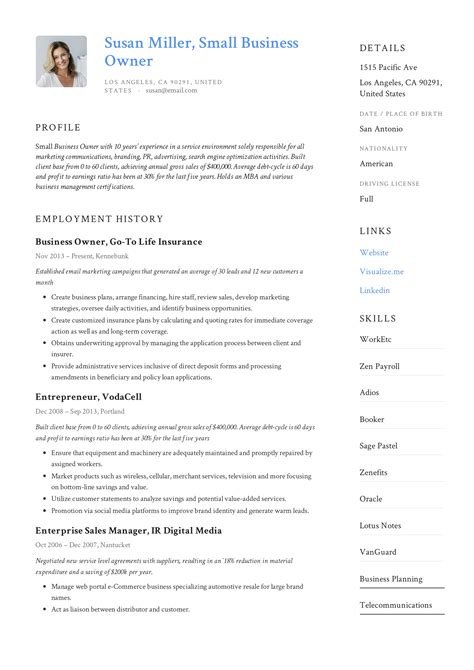Craft a compelling entrepreneurial resume with key responsibilities and achievements. Showcase decision-making, leadership, strategic planning, and business development skills effectively.Are you a business owner looking to update your resume and showcase your entrepreneurial skills and accomplishments? Crafting a resume that effectively highlights your entrepreneurial experience can be a powerful tool in standing out to potential employers or investors. In this blog post, we will explore the key components of a resume for a business owner, including how to create a compelling introduction that captures your entrepreneurial spirit, outlining your key responsibilities and achievements as a business owner, demonstrating your leadership and decision-making abilities, and showcasing your strategic planning and business development skills. By following these essential subheadings, you can effectively communicate your unique value as a business owner and increase your chances of landing your next opportunity. Whether you’re seeking new business partnerships, exploring investment opportunities, or considering a career transition, a well-crafted resume can make all the difference. So, let’s dive into creating a standout resume that truly reflects your entrepreneurial expertise.
Entrepreneurial Resume Introduction
When crafting an entrepreneurial resume, it’s important to highlight your unique background and experience as a business owner. Your resume should effectively communicate your entrepreneurial spirit and showcase your ability to take initiative and drive results in a fast-paced, dynamic environment. Emphasize your hands-on experience in launching and growing a successful business, as well as your ability to adapt to changing market conditions and identify new opportunities for growth. This section of your resume is your chance to stand out from the crowd and demonstrate your passion for entrepreneurship.
Highlight your key achievements and milestones as a business owner, such as surpassing revenue targets, expanding into new markets, or launching innovative products or services. Use specific examples to illustrate your impact and showcase your ability to drive business success. Additionally, emphasize any unique challenges you’ve overcome or risks you’ve taken to achieve business growth and profitability. This will demonstrate your resilience and determination as an entrepreneur, setting you apart from other candidates in the eyes of potential employers.
Overall, the entrepreneurial resume introduction should provide a compelling overview of your experience as a business owner and convey your ability to drive business success through innovation, strategic decision-making, and a strong entrepreneurial mindset. Use this section to capture the attention of hiring managers and position yourself as a highly motivated and results-driven entrepreneurial professional.
Key Responsibilities and Achievements
Key Responsibilities and Achievements
As a business owner, you have a wide range of responsibilities that you take on in order to ensure the success of your business. Whether it’s managing finances, leading a team of employees, or developing business strategies, there are many key responsibilities that fall under your purview. One of the primary responsibilities of a business owner is to set the overall direction and strategy for the company, making important decisions that will impact the success of the business. Additionally, business owners are often responsible for managing all aspects of the business, from finances to operations to customer relations.
When it comes to achievements, as a business owner, there are many milestones and successes that can be attributed to your leadership and hard work. This might include achieving significant revenue growth, expanding into new markets, or launching successful marketing campaigns that have led to increased brand awareness and customer engagement. It’s important to highlight these achievements on your resume in order to showcase the impact that you have had on the success of your business.
Demonstrating Leadership and Decision Making
When it comes to demonstrating leadership and decision making on a resume, it’s important to showcase your ability to take charge and guide a team towards success. This can be done by highlighting specific instances where you have successfully led a project or made critical decisions that had a positive impact on the business.
One way to demonstrate your leadership skills is by showcasing any leadership roles you have held in previous positions. Whether it’s managing a team, leading a project, or serving on a leadership committee, highlighting these experiences can show potential employers that you have the ability to take charge and lead others effectively.
In addition to highlighting specific leadership roles, it’s also important to showcase examples of your decision-making abilities. This can include instances where you had to make tough decisions under pressure, analyze data to make strategic decisions, or implement new processes that had a positive impact on the business.
Strategic Planning and Business Development
resume examples business owner
Strategic Planning and Business Development
As a business owner, strategic planning and business development are critical components of success. One of the key responsibilities in this area is to analyze market trends and identify opportunities for growth. This may involve conducting market research, studying consumer behavior, and monitoring industry developments. By staying informed about the ever-changing business landscape, business owners can make informed decisions about the direction of their company.
Another aspect of strategic planning and business development is creating and implementing long-term business plans. This involves setting achievable goals, developing strategies to achieve those goals, and regularly evaluating progress. By establishing a clear roadmap for the future, business owners can navigate challenges and capitalize on opportunities as they arise.
Furthermore, effective business development requires building and nurturing relationships with stakeholders, including customers, suppliers, and partners. This may involve networking, attending industry events, and fostering collaborations. By cultivating strong partnerships, business owners can enhance their company’s reputation and create new opportunities for growth.
